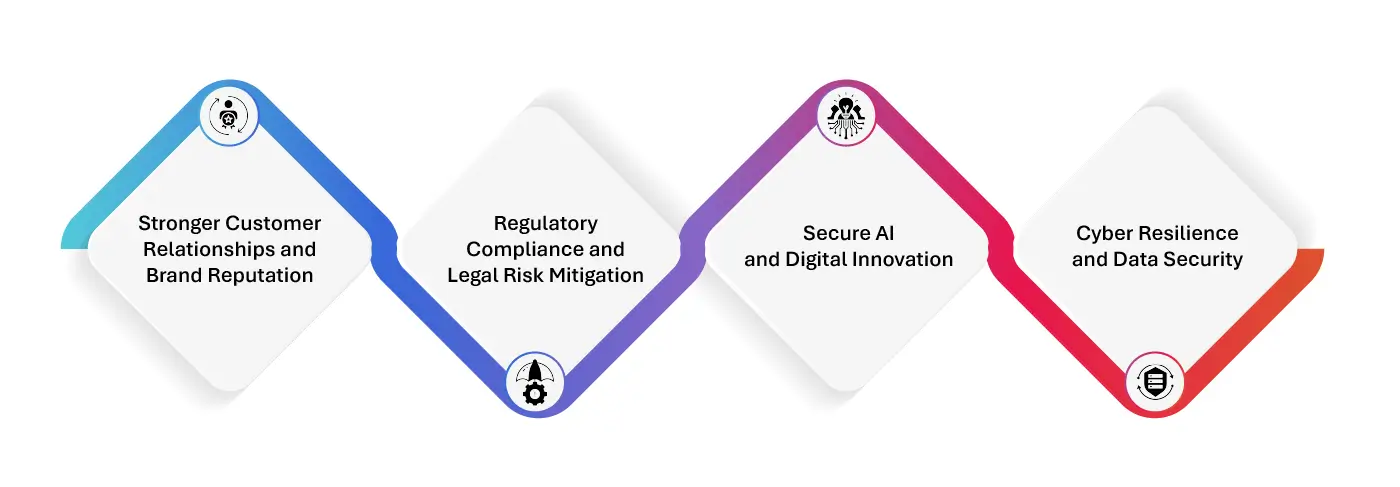What is Digital Trust?
Digital Trust is the cornerstone of a successful digital strategy, reflecting the confidence that users, customers, and stakeholders place in an organization’s ability to protect their data, ensure privacy, and maintain the integrity of digital interactions. It is built on a foundation of robust security practices, transparent data governance, and ethical management of digital assets, ensuring compliance with regulations and fostering long-term relationships. By prioritizing digital trust, organizations not only safeguard their reputation but also drive competitive advantage and sustain growth in the digital economy.
Why is Digital Trust Important?
In an increasingly digital world, trust is the backbone of successful interactions between individuals, businesses, and institutions. As organizations rely more on digital platforms, AI-driven decision-making, and data-driven operations, digital trust becomes a non-negotiable factor in ensuring ethical, secure, and transparent processes. Without trust, users hesitate to share data, businesses struggle with regulatory scrutiny, and innovation slows down due to security concerns.
Here’s why digital trust is critical in today’s landscape:

- Stronger Customer Relationships & Brand Reputation: Trust is a key driver of customer loyalty. When businesses demonstrate a commitment to data privacy and security, customers are more likely to engage, transact, and advocate for their brand. A breach of digital trust—such as a data leak or unethical AI use—can lead to reputational damage that is difficult to recover from.
- Regulatory Compliance & Legal Risk Mitigation: Governments worldwide have introduced stringent data protection regulations such as GDPR (Europe), CCPA (California), DPDP Act (India), and China’s PIPL to protect consumers from unauthorized data collection and misuse. Organizations that fail to uphold these laws risk heavy fines, legal consequences, and loss of operational licenses. Digital trust ensures proactive compliance rather than reactive damage control.
- Secure AI and Digital Innovation: AI and machine learning models rely on vast amounts of data. If businesses want to unlock the full potential of AI, they must ensure that the data fueling AI systems is secure, unbiased, and ethically sourced. Digital trust provides the foundation for safe AI innovation, allowing enterprises to deploy AI-driven solutions without ethical, security, or legal backlash.
- Cyber Resilience & Data Security: The rise in cyber threats, ransomware attacks, and data breaches has made cybersecurity a top priority for organizations worldwide. Businesses that embed robust cybersecurity frameworks, proactive threat detection, and end-to-end encryption into their digital infrastructure prevent financial and operational losses and build long-term digital trust with their customers, partners, and employees.
Digital Trust in AI and Data Management
With AI and unstructured data shaping industries, digital trust is essential for ensuring that AI-driven decisions are ethical, transparent, and secure. AI models require massive datasets to function effectively, but if the data is compromised, biased, or lacks governance, the outcomes can be misleading and harmful.
- AI & Data Governance: The Role of Trust
- AI models depend on high-quality, well-governed data to generate accurate insights. If enterprises lack governance frameworks, AI can amplify existing biases, create compliance risks, and even expose sensitive information.
- Self-service data management frameworks can enhance digital trust by ensuring that data owners have visibility, control, and security measures in place.
- AI-driven data lineage tracking allows organizations to trace the origins, transformations, and usage of data to maintain integrity and trustworthiness.
- Data Sovereignty & Security in AI Applications
- AI models trained on sensitive or cross-border data must comply with local and global data protection laws.
- Implementing sovereign cloud strategies, encryption protocols, and access restrictions ensures compliance while allowing AI models to operate efficiently.
- AI-driven risk management tools can predict and mitigate security vulnerabilities in real time, protecting enterprises from unauthorized data breaches.
- Building Ethical AI Models with Digital Trust
- Trust in AI is built through transparency, explainability, and accountability. Organizations must ensure that AI models provide clear, interpretable results rather than ‘black-box’ outputs.
- Human oversight in AI-driven decision-making is crucial for preventing errors, bias, and unintended consequences.
- Regulatory bodies and AI governance frameworks must be integrated into enterprise AI strategies to ensure ethical AI development.
In an AI-driven, data-centric world, digital trust is more than a compliance necessity—it’s a strategic enabler for innovation, security, and long-term business success. Organizations that prioritize transparency, ethical AI, data governance, and cybersecurity will not only safeguard their operations but also build lasting customer confidence and regulatory resilience. As digital interactions become more complex, trust will be the defining factor that separates industry leaders from those struggling to keep up.
Industry Insights and Trends
- By 2030, over 70% of the global population will have a digital identity.
- By 2025, 15% of large enterprises will have begun transitioning to quantum-resistant cryptography to safeguard their data.
- 76% of individuals want the option to have more control over their data.
Getting Started with Data Dynamics:
- Learn about our Unstructured Data Management Software – Zubin
- Schedule a demo with our team
- Read the latest blog: Unstructured Data: The Blind Spot CISOs and CIOs Must Solve—Together






